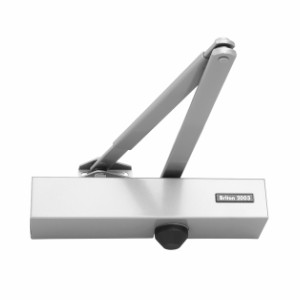What Is A Door Closer?
A door closer is a type of door furniture that is fitted to a door to ensure that it closes in a controlled way. So this means that the door closes correctly in the manner that it is designed to and that the user desires. A door closer will operate whether the door is opened automatically or manually. According to current safety regulations in the UK, door closers should be fitted to almost every fire doors. (there maybe some exceptions, such as duct doors / private residential properties).
What is the purpose of a door closer?

There are many different types of door closer which are appropriate for different types of door and different locations and buildings, but essentially all door closers will be required to carry out one or more of these functions:
- Helps to ensure a door is closed once someone has passed through it, for fire safety reasons and to prevent the spread of fire and smoke
- Ensures a door closes slowly and safely to prevent noise, injury or damage to the building
- Ensures a door is suitably closed to maximise security (some automatic locking systems will only engage if a door is resting in the proper closed position)
- Helps to reduce cold air flow which minimises drafts, and also makes air conditioning systems more effective, thus also reducing energy costs.
What different types of door closer are there?
The most common and most cost-effective type of door closer is a surface-mounted door closer. Typically these are a two-piece unit with a rack and pinion arm that is hinged on a pivot and is attached at one end to the door frame, and on the other end to the main body of the door closer. This main body is a box which includes the mechanism for controlling the door closing, which can be mechanical or hydraulic. This main body is surface mounted on the door.
Automatic door closers use an actuator switch which activates the door opening/closing with the push of a button and a hydraulic or motorised opening/closing system. These are common in healthcare settings or for disabled access. Finally, we have concealed door closers, which are mechanisms built into the frame, the door or the floorsprings. These are usually chosen for aesthetic reasons, as there is no door-closing mechanism on view.
In most cases the speed of the door closing can be adjusted so that it is appropriate to the type of traffic travelling through the door, and therefore provides sufficient time in a safe manner. Delayed closing can therefore be implemented as a door closer feature, as can a ‘backcheck’ feature. This ensures that a door is not opened too quickly. This can be useful for external doors in locations where high winds can gather, or for internal doors where there are powerful drafts or air pressure. The backcheck feature prevents people getting injured or the door becoming damaged when it catches the wind.
What do you need to consider when choosing a door closer?
There are a number of things you need to think about when choosing the most appropriate door closer for your door:
- What type and frequency of traffic travels through the door?
- Is it an inward or outward opening door?
- Is the door too heavy or the swing too powerful for the door closer you have chosen?
- What size is the door and the door frame?
- Can the door closer be fitted safely and securely?
In addition to these considerations, you need to assess what you need from a door closer in your given situation, and this should help you narrow down the options and find the most suitable type. So fundamentally you need a door closer:
- That is suitable for the door you have
- That is suitable for the amount of traffic
- That ensures the door can be opened safely by the people using it
- That closes the door reliably and consistently
- That closes the door safely and without slamming and causing noise or damage
- That holds the door closed against normal air pressure, hence ensuring safety, security and environmental cost-effectiveness.
It is important to note that the decision on what type of door closer to choose for your building may be dictated by third parties. So building regulations, insurance companies or safety audits may demand that you install a certain type of door closer.